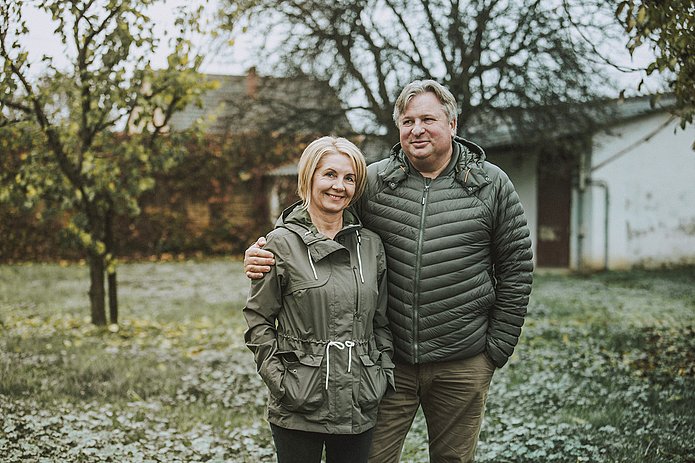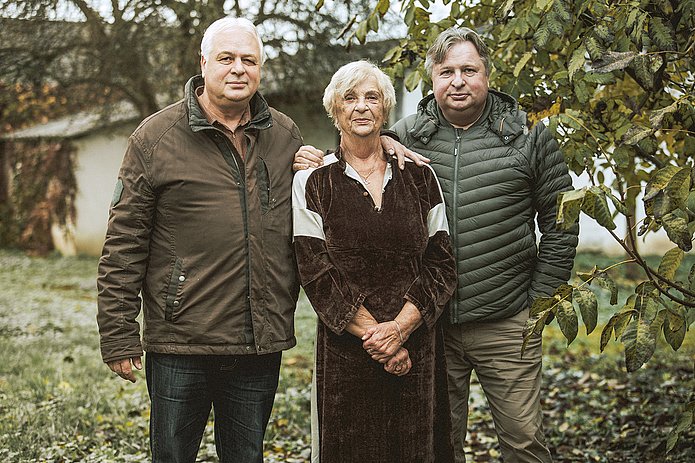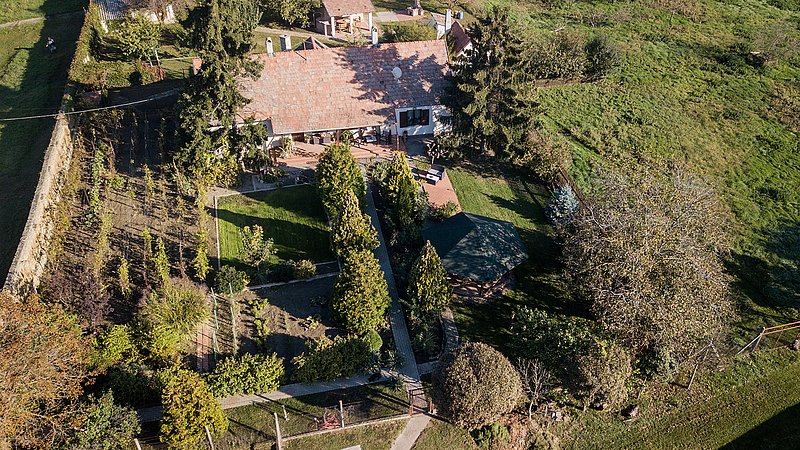
Achieve a lot with just a little
Bács-Cereal Kft., HU
The shortage of labour is one of the biggest challenges in the Hungarian agricultural sector. About one fifth of the actually required workers are missing on the market. The Csontos family, too, is faced with this problem. The challenge: How can you get the same work done with less employees? Their solution: minimum tillage without a plough.
Due to its plain landscape Hungary offers optimum conditions for farming. The climate is continental with frequent dry periods. With regard to the hours of sunshine – about 1,900 to 2,500 per year – Hungary ranks top in the European average. Based on these conditions almost all important crops that are suitable for the temperate climate can be grown in Hungary.
The plant protection and agro-chemical engineer Károly Csontos is responsible for the agronomic part – not only on the family farm, but also in the Bács-Cereal Kft. His mother, Mária Csontos Károlyné, runs the family farm. His brother, Attila Csontos, is the managing director of the Bács-Cereal Kft. and takes care of all business matters. Attila’s wife, Szilvia Csontosné Kocsi, is the co-director and in addition to the staff and work planning is also responsible for accounting. They attach utmost importance to teamwork. Their common objective is to make farming as profitable as possible. terraHORSCH talked to Károly Csontos about what this means in detail.
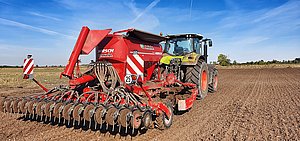
Both farms cultivate a total of 250 ha. They share all the machines. Last year they converted the farms to a plough less system – including an investment that compared to the farm size was rather large: they purchased a universal cultivator HORSCH Terrano 4.3 GX, a disc harrow HORSCH Joker 5 RT, a universal seed drill HORSCH Pronto 4 DC as well as a Claas-Axion-850-tractor with 260 hp. And this spring the machine park was completed with a trailed sprayer HORSCH Leeb 4 AX.
„My father founded our family farm in the late 80s. At first, we only farmed 5 ha, step by step the number of hectares increased.
The soils here in North-Bácska are calcareous black earth soils. Thus, the conditions are optimum. The soils are easy to cultivate, their water balance is excellent, and they have a good structure. The humus content is very high. The land of our farm is divided into more than ten fields, but fortunately they are quite close together. The largest distance is about three to four kilometer. So we do not have to cover large distances between the fields. The size of the plots differs: There are larger plots with 40 to 55 ha, but also smaller ones with only five to ten ha.
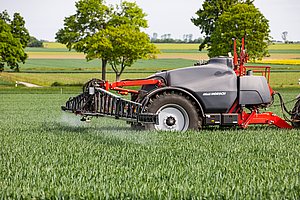
Our rotation is simple. Our objective is to optimise the number of crops in such a way that we get an agronomically reasonable rotation. Our main crops are wheat, hard wheat, rape and soya. In the past, we grew soya organically. But when the EU regulation that forbid to carry out plant protection measures in organic soya took effect, we gave it up. Fields where cultivation does not pay off from an economic point of view are used as fallow land. For wheat we always chose early varieties, e.g. GK-Futár, GK-Csillag, GK-Pilis, GK-Bétadur, GK-Julidur. The harvest is sold to a mill. Therefore, quality, of course, has to be top. For quite some time now we have been using Dekalb hybrid rape which is ideal for our conditions.
If the weather plays along, our yields are rather good: six tons for wheat and three to 3.5 tons for rape on average. However, the rape yield once even amounted to four tons and the wheat yield to seven tons. At that time, the weather conditions were optimum. But last year we had to grapple with extreme weather. From September until end of April it hardly rained. Minimum tillage, however, helps to keep water in the soil. But this was not the only reason why we converted our farm. For quite a long time we have been carrying out conventional tillage: ploughing, loosening, then a pass with the disc harrow, after that with a cultivator and after sowing another pass with a packer. There were quite a lot of passes. At least two to three tractors were required to get the work done in time. However, because of the situation on the labour market it became more and more difficult to find drivers for the tractors. The lack of labour became a constantly growing, serious problem. Last year we finally decided to convert to minimum tillage without a plough. The work that before with conventional tillage was done by three people now is carried out by one employee. His workload is quite considerable, but it works.
When it was about purchasing the machines, we solicited quotations from several companies. But we finally opted for HORSCH and the dealer Axial. We are already familiar with HORSCH machines and we know that the technical standard of the machines is extremely high. Moreover, Axial offers an exceptionally reliable service.“
Good experiences
„We do not regret our decision. The machines do an excellent job. With the Joker you can work shallowly at a depth of five cm. This has proven its worth on our fields as, thus, you can keep a lot of water in the soil. Shallow tillage also is ideal for the emergence of the crops. Weeds are fought mechanically. After the Terrano we use a disc harrow to get a perfect seedbed. It is important to create a crumbly seedbed at an even depth and to carefully level the soil on the surface.
The working depth and the metering of the Pronto 4 DC were optimum for rape. The set values were maintained exactly. Last year, rape germinated really well and without any problems. Fortunately, we had 15 mm of rain right after sowing. Wheat, however, germinated rather irregularly because of the extreme drought. This year, despite the drought, our rape yields improved– compared to our previous production system. With the minimum tillage system, we saved a lot of water. As the year was very dry, this was extremely important.
It did not rain until the end of April. In May, the rainfall amounted to 180 mm and partly to 200 and 220 mm. This, too, of course, was a problem! It rained so hard that it often was not possible to work in the field. This is the reason why the fusarium problem in some regions increased considerably. There were areas where wheat could not be sold as the toxin values were so high. On our fields, too, there was the risk of contamination, but with our new HORSCH Leeb Sprayer we were able to achieve a much better wetting and thus to protect our plants in an optimum way.“
Enthusiastic farmer
I love farming. I have a feeling of success when the professional achievement becomes visible in good yields and a high quality of the products. And I love nature. I love walking in the fields and watching the plants and the animals. This is why I so much appreciate the precision of the Leeb Sprayer. It contributes enormously to keep the environmental impact as low as possible. With our old sprayer one tank covered twelve hectares. Due to the 24 metre boom and the 4,000 litre tank the performance of the Leeb AX is much better. With 200 litre plant protection agent we now cover 20 hectares. Moreover, we cannot only work more efficiently, the acreage performance increases, too. With regard to drift it is essential that the sprayer constantly keeps up the 50 cm boom height. Even if there is a strong wind while spraying, we are able to achieve an optimum wetting and, thus, to reduce the environmental impact. In addition to these aspects, one should not disregard the financial side. Plant protection agents are expensive. And this is the reason why it does matter if they get into the air or into the population they are intended for. If the plants are protected against fusarium infections, you can achieve good prices. Contaminated wheat can at most be sold as fodder. And if the toxin content is very high not even that.“
What are the next steps?
„We think that we are done with the bulk of investments. But we always keep our eyes open for interesting, innovative developments. We do not have a combine and do not intend to buy one. Manax Ltd, a subsidiary of Axiál, carries out all the harvesting for us. We are more than happy with this solution. And I think that our current machine park will be perfectly ok for our 250 hectares for quite a long time. The employee who takes care of the machines is a real pro. He looks after them with great care as if they were his own machines. Such a good care will, of course, pay off in the long run.
Many farmers complain that farming to a great extent depends on the weather und therefore is a very insecure business. They are right, of course, A lot depends on the weather. But if you set up the machine park in an intelligent way, choose the right crops and varieties, use and develop the professional skills, knowledge and experiences deliberately and remain open for innovations, farming can be successful.“
